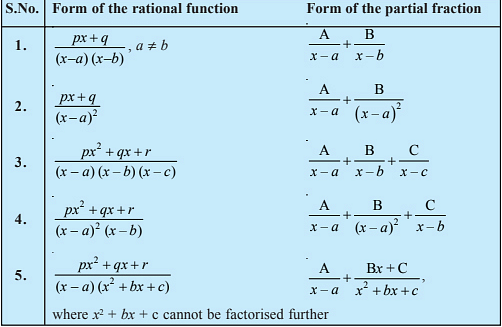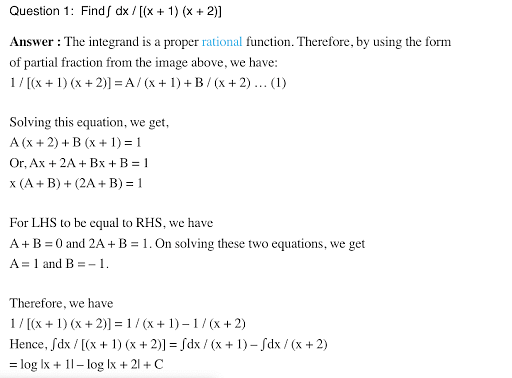Question:
Integrate the function: \(\frac{xe^x}{(1+x)^2}\)
Integrate the function: \(\frac{xe^x}{(1+x)^2}\)
Updated On: Oct 4, 2023
Hide Solution
Verified By Collegedunia
Solution and Explanation
The correct answer is: \(∫\frac{xe^x}{(1+x)^2}dx=\frac{e^x}{1+x}+C\)
Let \(I=∫\frac{xe^x}{(1+x)^2} dx=∫e^x{\frac{x}{(1+x)^2}}dx\)
\(=∫e^x=[\frac{1+x-1}{(1+x)^2}]dx\)
\(=∫e^x=[\frac{1}{1+x}-\frac{1}{(1+x)^2}]dx\)
Let \(ƒ(x)=\frac{1}{1+x}\,\, ƒ'(x)=\frac{-1}{(1+x)^2}\)
\(⇒∫\frac{xe^x}{(1+x)^2}dx=∫e^x[{ƒ(x)+ƒ'(x)}]dx\)
It is known that,\(∫e^x[ƒ(x)+ƒ'(x)]dx=e^xƒ(x)+C\)
\(∴∫\frac{xe^x}{(1+x)^2}dx=\frac{e^x}{1+x}+C\)
Let \(I=∫\frac{xe^x}{(1+x)^2} dx=∫e^x{\frac{x}{(1+x)^2}}dx\)
\(=∫e^x=[\frac{1+x-1}{(1+x)^2}]dx\)
\(=∫e^x=[\frac{1}{1+x}-\frac{1}{(1+x)^2}]dx\)
Let \(ƒ(x)=\frac{1}{1+x}\,\, ƒ'(x)=\frac{-1}{(1+x)^2}\)
\(⇒∫\frac{xe^x}{(1+x)^2}dx=∫e^x[{ƒ(x)+ƒ'(x)}]dx\)
It is known that,\(∫e^x[ƒ(x)+ƒ'(x)]dx=e^xƒ(x)+C\)
\(∴∫\frac{xe^x}{(1+x)^2}dx=\frac{e^x}{1+x}+C\)
Was this answer helpful?
0
0
Top Questions on integral
Let \( f : (0, \infty) \to \mathbb{R} \) be a twice differentiable function. If for some \( a \neq 0 \), } \[ \int_0^a f(x) \, dx = f(a), \quad f(1) = 1, \quad f(16) = \frac{1}{8}, \quad \text{then } 16 - f^{-1}\left( \frac{1}{16} \right) \text{ is equal to:}\]
- Let $ f(x) $ be a positive function and $I_1 = \int_{-\frac{1}{2}}^1 2x \, f\left(2x(1-2x)\right) dx$ and $I_2 = \int_{-1}^2 f\left(x(1-x)\right) dx.$ Then the value of $\frac{I_2}{I_1}$ is equal to ____
- Evaluate the integral: \[ \int \frac{x^2 + 2x}{\sqrt{x^2 + 1}} \, dx \]
- Evaluate the integral: \[ \int \sqrt{x^2 + 3x} \, dx \]
- The value of the integral \( \int_0^1 x^2 \, dx \) is:
View More Questions
Questions Asked in CBSE CLASS XII exam
- A charge \( -6 \mu C \) is placed at the center B of a semicircle of radius 5 cm, as shown in the figure. An equal and opposite charge is placed at point D at a distance of 10 cm from B. A charge \( +5 \mu C \) is moved from point ‘C’ to point ‘A’ along the circumference. Calculate the work done on the charge.

- CBSE CLASS XII - 2025
- Electrostatics
- Two statements are given, one labelled Assertion (A) and the other labelled Reason (R). Select the correct answer from the codes (A), (B), (C), and (D) as given below.
Assertion (A): In double slit experiment, if one slit is closed, diffraction pattern due to the other slit will appear on the screen.
Reason (R): For interference, at least two waves are required.
- CBSE CLASS XII - 2025
- Wave optics
- Write the cell reaction and calculate the e.m.f. of the following cell at 298 K:
\[ \text{Sn}(s) \mid \text{Sn}^{2+} (\text{0.004 M}) \parallel \text{H}^+ (\text{0.02 M}) \mid \text{H}_2 (\text{1 Bar}) \mid \text{Pt}(s) \]
(Given: \( E^\circ_{\text{Sn}^{2+}/\text{Sn}} = -0.14 \, \text{V}, E^\circ_{\text{H}^+/\text{H}_2} = 0.00 \, \text{V} \))- CBSE CLASS XII - 2025
- Electrochemistry
If vector \( \mathbf{a} = 3 \hat{i} + 2 \hat{j} - \hat{k} \) \text{ and } \( \mathbf{b} = \hat{i} - \hat{j} + \hat{k} \), then which of the following is correct?
- Find the value of $x$, if \[ \begin{bmatrix} 1 & 3 & 2 \\ 2 & 5 & 1 \\ 15 & 3 & 2 \end{bmatrix} \begin{bmatrix} 1 \\ x \\ 2 \end{bmatrix} = \begin{bmatrix} 0 \\ 0 \\ 0 \end{bmatrix} \]
View More Questions
Concepts Used:
Integration by Partial Fractions
The number of formulas used to decompose the given improper rational functions is given below. By using the given expressions, we can quickly write the integrand as a sum of proper rational functions.

For examples,
